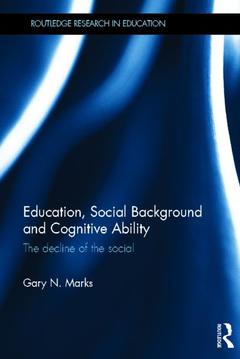Education, Social Background and Cognitive Ability The decline of the social Routledge Research in Education Series
Auteur : Marks Gary N.

Are socioeconomic inequalities in education declining? Is socioeconomic background becoming less important for people?s occupational class or status? How important is cognitive ability for education and later occupational outcomes? How do countries differ in the importance of socioeconomic background for education and work?
Gary N. Marks argues that in western industrialized countries, pervasive views that socioeconomic background (or class background) has strong and unchanging relationships with education and later socioeconomic outcomes, resistant to policy and social change, are unfounded. Marks provides a large amount of evidence from many countries showing that the influence of socioeconomic background for education is moderate and most often declining, and socioeconomic background has only very weak impacts on adults? occupation and earnings after taking into account education and cognitive ability.
Furthermore, Marks shows that cognitive ability is a more powerful influence than socioeconomic background for educational outcomes, and that in addition to its indirect effects through education has a direct effect on occupation and earnings. Its effects cannot be dismissed as simply another aspect of socioeconomic background, nor do the usual criticisms of ?cognitive ability? apply. The declining effects for socioeconomic background and the importance of cognitive ability support several of the contentions of modernization theory.
The book contributes to a variety of debates within sociology: quantitative and qualitative approaches, explanatory and non-explanatory theory, the relationship between theory and empirical research, the role of political ideology in research, sociology as a social science, and sociology?s contribution to knowledge about contemporary societies. It will appeal to professionals in the fields of education and sociology as well as postgraduate students and academics involved in the debate.
1: Introduction 2: Theoretical Matters 3: Concepts, Measures and Statistics 4: Cognitive Ability I: Conceptual Issues, Stability and Origins 5: Cognitive Ability II: Educational Outcomes 6: Cognitive Ability III: Labor Market Outcomes 7: Socioeconomic Inequalities in Education I: The Strength of the Relationship 8: Socioeconomic Inequalities in Education II: Theoretical Explanations 9: Socioeconomic Inequalities in Education III: Changes over Time 10: Occupational Attainment 11: Reproduction of Economic Inequalities 12: Conclusions and Discussion
Gary N. Marks is a Principal Research Fellow at the Melbourne Institute of Applied Economic and Social Research, the University of Melbourne, Australia.
Date de parution : 09-2013
15.6x23.4 cm
Date de parution : 06-2015
15.6x23.4 cm
Thème d’Education, Social Background and Cognitive Ability :
Mots-clés :
West Germany; School Sector Differences; Adult Labor Market Outcomes; Father’s Occupational Status; AFQT Score; Average School Socioeconomic Status; Intergenerational Correlations; PISA Test Score; Average IQ Score; Class; Socioeconomic Inequalities; Cognitive Ability; Non-cognitive Attributes; Education; Knowledge Acquisition; Policy; Log Linear Modeling; Socioeconomic inequality; Father’s Education; society; Son’s Occupational Status; sociology; Father’s Occupational Prestige; sociology of education; Child’s IQ; School SES; Intergenerational Elasticities; Occupational Attainment; Cultural Capital Theory; Father’s Earnings; Van De Werfhorst; Mother’s Occupational Status; Post-secondary Education



